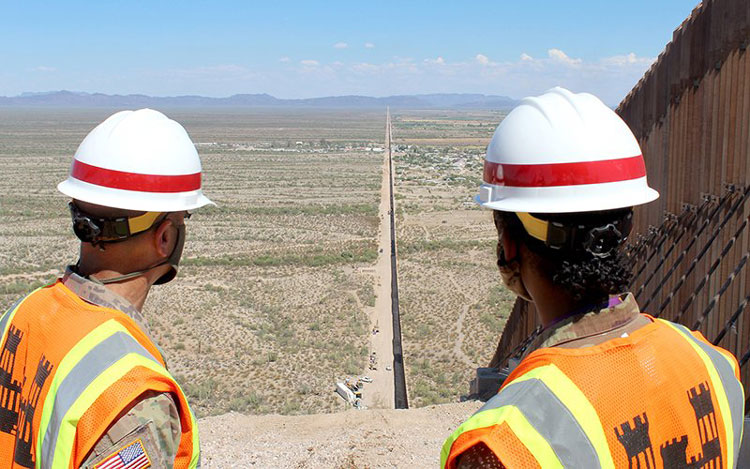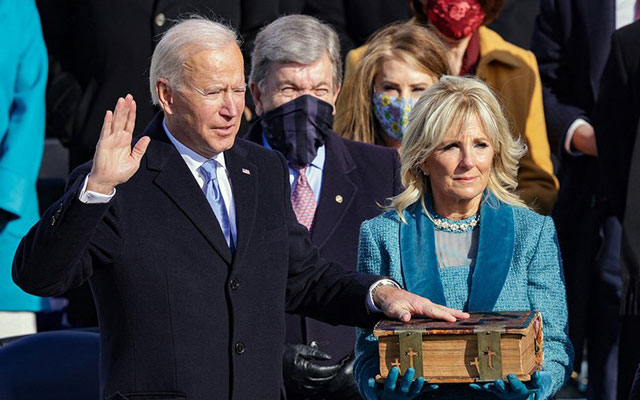Photo By Alex Wong/Getty Images-Cronkite News: President Joe Biden takes the oat of office Wednesday as his wife, Jill, holds the Bible. Even before he was sworn in, Biden unveiled an ambitious immigration reform package that includes a potential path to citizenship for millions of undocumented immigrants.
By Ryan Knappenberger/Cronkite News
WASHINGTON – President Joe Biden unveiled a sweeping immigration reform bill Wednesday that would create a pathway to citizenship for millions of undocumented immigrants, preserve DACA and end the ban on travel from Muslim-majority countries, among other changes.
The proposal, released on the first day of his presidency, is a sharp reversal from former President Donald Trump’s policies and was hailed by advocates for righting “the cruelty that was the cornerstone” of Trump’s immigration actions.
But other experts warned that while there are many good elements in the bill, it has little chance of passing the Senate without revisions.
“The big thing is the legalization of illegal immigrants, that’s a non-starter for a majority of Republicans,” said Alex Nowrasteh, director of immigration studies at the Cato Institute. In its current form, Nowrasteh, “has no chance of passing.”
Supporters would need to get 60 votes to overcome any likely filibuster attempts in the Senate, which is now evenly divided between Democrats and Republicans with Vice President Kamala Harris, a Democrat, holding the potential tie-breaking vote.
But those concerns did not dim its reception among supporters like the International Rescue Committee, an advocacy group for refugees, which said in a written statement Wednesday that the bill “helps transition America back to competent and humane leadership.”
“The Trump Administration left an unsafe, unfair and broken asylum system that criminalizes asylum-seekers at the U.S. border,” the IRC statement said.
The proposed U.S. Citizenship Act of 2021, which Biden sent to Congress on Wednesday, outlines a path to citizenship that would allow undocumented immigrants to get a green card in five years and full citizenship three years after that. The process could cut up to five years off the process for recipients of Deferred Action for Childhood Arrivals protection, for Temporary Protected Status holders and agricultural workers.
The Migration Policy Institute estimated that there were just under 11 million undocumented immigrants in the U.S. in 2018, with 281,000 of those in Arizona. According to U.S. Citizenship and Immigration Services, the 24,140 DACA recipients in Arizona last June was the sixth-highest among states. The Congressional Research Service reported that 1,653 Arizona residents were TPS recipients in November 2019.
The bill also pledges to reverse the Trump administration’s “family separation” policy and allow immigrants to join family members in the United States while waiting for green cards, a policy Trump derided as “chain migration.”
The bill calls for investigation of Homeland Security activities along the southern border, with increased guidance on use-of-force policies as well as funding for increased care for migrants in Customs and Border Protection facilities.
Finally, the act would provide aid to the “Northern Triangle” countries of Guatemala, Honduras and El Salvador that migrants are fleeing. The goal would be to “start from the source” with slowing migrants, while increasing protections for refugees and vulnerable populations.
The bill, while sweeping, does not address every concern put forth by advocates.
Before the measure was unveiled Wednesday, the Puente Human Rights Movement, an advocacy group in support of marginalized communities in Arizona, released a statement outlining six policy demands. They include a moratorium on deportations, an investigation of DHS, an end to contracts with private prisons, decriminalization of border migration and abolition of surveillance of communities of color.
Biden’s bill would only meet the demand for a DHS probe, and that investigation would be limited to misconduct and overreach by the department.

While comprehensive immigration reform passed the Senate by a comfortable margin in 2013, Nowrasteh said the party has shifted under Trump and is now more hawkish on immigration.
“At minimum, they would want a border wall, more ICE (Immigration and Customs Enforcement) and law enforcement agents, and outlawing or diverting funding from sanctuary cities,” Nowrasteh said.
He thinks it is likely that Democrats will compromise in order to pass some protections, saying they have been “shell-shocked by the Trump era.”
He expects the Biden administration will instead opt to follow in the footsteps of previous administrations and “rule by executive orders,” a decades-long trend Nowrasteh said only grew stronger under Trump.
Supporters still welcomed Biden’s moves, which Rep. Raúl Grijalva, D-Tucson, called them “important first steps to right the cruelty that was the cornerstone of all of Trump’s immigration actions.”
“Restoring DACA, ending a racist Muslim Ban, and stopping ICE’s reign of terror in our communities are critical foundations for creating an immigration system that puts families and humanity first,” Grijalva said in a statement, that went to urge Biden to keep his promise that “not another foot of border wall is constructed.”









